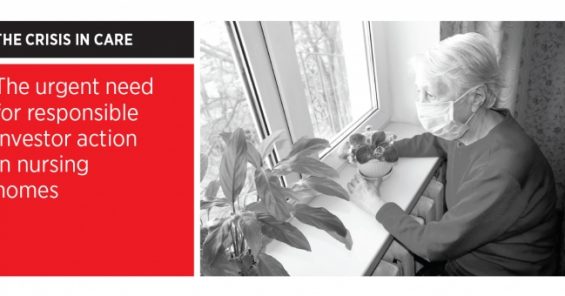- Investors bear responsibility to tackle deep-seated challenges that jeopardize the lives of nursing home residents and workers
- UNI is calling on investors in nursing homes to classify the sector as high risk, and work with UNI to carry out critical due diligence
- Lax health and safety standards, under-staffing, low wages, temporary contracts and over-financialization have all contributed to surging COVID-19 deaths in nursing homes
- Trade unions can help reduce coronavirus infection rates by improving working conditions, which in turn increases all standards.
Nyon, Switzerland, 15 December 2020 – UNI Global Union, which represents two million care workers worldwide, is calling on investors in nursing homes to take urgent action to address the deepening crisis in long-term care.
A report released by UNI today highlights the legal, human rights and operational risks of investments in nursing homes caused by a combination of poor health and safety, understaffing, low wages, temporary contracts and over-financialization.
The entrenched problems in the sector have increased the vulnerability of nursing homes to the coronavirus, with estimates from 21 countries showing that on average 46% of COVID-19 deaths were care home residents as of mid-October.
“Residents and workers in nursing homes deserve better than the dangerous and deeply unsustainable model of long-term care. Investors have a pivotal role to play in addressing the crisis in the sector and setting standards higher,” said Christy Hoffman, General Secretary of UNI Global Union. “COVID-19 has exposed the fundamental flaws in a system of low pay, poor contracts and lack of worker voice. Freedom of association and collective bargaining are key to improving working conditions, health and safety and the quality of care in nursing homes.”
The report shows that trade unions are a key differentiator in helping to reduce coronavirus infection rates through unions’ roles in demanding high staff to patient ratios, paid sick leave and PPE and higher wages and benefits, which reduces staff turnover. A study of 355 nursing homes in New York State found the presence of a health care worker union was associated with a 30% lower mortality rate from COVID-19 among nursing home residents.
However, without investor impetus across the sector, individual nursing homes will be unable to break the downward cycle of pressures, says the report.
UNI is calling on investors to classify nursing homes as a high-risk industry and use their stewardship activities and investment decision-making to drive up standards in the sector. UNI plans to work together with investors to develop best practices for action in the coming year.
“Investors must now carry out proper due diligence into their investments in nursing homes, and not forget they bear responsibility for the critical care of vulnerable, elderly people at the end of their lives,” stressed Hoffman. “Vaccination programmes may eventually solve the contagion and deaths related to COVID but they are not the long term answer to the risks presented by the conditions in nursing homes. Now that these risks have been exposed, it is irresponsible to wait until the next pandemic to fix the problems.”
Commenting on the report, Tom Powdrill, Head of Stewardship at PIRC, which is Europe’s largest, independent investor advisory company, said:
“When we look at workplace Covid clusters, and fatalities, it’s clear that care workers in nursing homes have done their job at enormous personal risk during the pandemic. Yet their employers have not always treated them well, and we have heard traumatic stories from care workers, who are often poorly paid and on insecure contracts. It is evident that the sector is high risk to workers, residents, companies and investors in turn. Responsible investors should be looking at the care sector as an area where they can make a positive impact and reduce these risks, whether they have exposure through public or private equity.”
Maciej Kucharczyk, Secretary-General from AGE Platform Europe – a network of non-profit organizations that promotes the interests of 200 million over-50s across Europe – said:
“Investment in care is essential, and there is still a huge investment gap in Europe that needs to be closed. But we also know that quality care services are essential to preserve the dignity of older people. That is why we need investors to behave responsibly. The pandemic has proven that we need care services that ensure the well-being, dignity and autonomy of the individual. The working conditions of staff are equally important. The pursuit of profitability is secondary and cannot overrun any of these considerations.”
ENDS
For more information, please contact: Leonie Guguen, Senior Communications Manager, UNI Global Union. Tel: +41 79 137 5436. Email: leonie.guguen@uniglobalunion.org
UNI Global Union, based in Nyon, Switzerland, represents more than 20 million workers from over 150 different countries in the fastest growing sectors in the world – skills and services.


